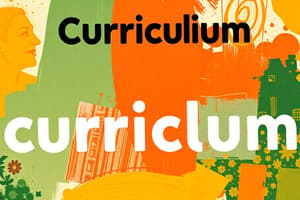Podcast
Questions and Answers
Qual es le categoria principal in le NARS que se refere al competentias operative e professional?
Qual es le categoria principal in le NARS que se refere al competentias operative e professional?
- Competentias Transferibile
- Competentias Pratic (correct)
- Attributes Generale
- Competentias Intellectual
Quales caracteristicas representa le 'Intended Learning Outcomes' in le context de NARS?
Quales caracteristicas representa le 'Intended Learning Outcomes' in le context de NARS?
- Integrazione de technologie in le practica
- Ambiente de labor e recursos didactic
- Conoscente specific e habilidades professionale (correct)
- Metodologias didactic e evaluationes
Qual es un de le objetos principal del NARS Dentistry?
Qual es un de le objetos principal del NARS Dentistry?
- Promover le concurrentia in le campo de dentisteria
- Desarrollar competencias in communicatione
- Fornir un fundation solide in expertises professionale (correct)
- Familiarisar le studenti con le tecnologia moderna
Le qualitas de 'Knowledge and understanding' es parte de qual categoria en le NARS?
Le qualitas de 'Knowledge and understanding' es parte de qual categoria en le NARS?
Qual es le differentiamento inter 'practical skills' e 'intellectual skills' in le context de NARS?
Qual es le differentiamento inter 'practical skills' e 'intellectual skills' in le context de NARS?
Flashcards
Competences transferibile
Competences transferibile
Competences que pote esser transferite a diverse situationes e campos de studio.
Habilitates professional e practic
Habilitates professional e practic
Habilitates que se applica al practica del dentisteria.
Cognoscentia e comprension
Cognoscentia e comprension
Cognoscentia e comprension del principios fundamental del dentisteria.
Habilitates intellectual
Habilitates intellectual
Signup and view all the flashcards
Resultates de apprendimento intendente
Resultates de apprendimento intendente
Signup and view all the flashcards
Study Notes
Curriculum Overview
- Curriculum is the core of the educational process.
- Without a curriculum, no educational endeavor is conceivable.
- Curriculum acts as a pathway to achieving educational goals.
- Curriculum encompasses the practical activities, lectures, demonstrations, and field visits within a course, relating to client interactions.
- Curriculum can also be considered a written description of learning experiences.
Curriculum as an Educational Element
- Aims of education are manifest in the curriculum.
- Societal and life goals influence the curriculum.
- Societal and life goals change consistently.
- Curriculum is derived from the Latin word "currere," meaning "race course" or "runway," symbolizing a path toward a goal.
- The teacher acts as a guide, with the curriculum functioning as the guiding pathway.
- The curriculum represents the complete structure of ideas and activities.
Textbook Definition of Curriculum
- Curriculum signifies the formal or informal content and process facilitating student acquisition of knowledge, development of skills, and alterations in attitudes, appreciation, and values.
- Curriculum encompasses both what is learned (content) and how it is learned (process).
- Learning outcomes include knowledge, understanding, skills, attitudes, appreciation, and values.
Clarifying the Curriculum
- Curriculum is not just a list of courses; it also embodies purposes, content, activities, and organizational aspects within educational programs.
- Curriculum development involves teachers, students, and administrators actively shaping educational programs.
Curriculum Concepts
- Curriculum is dynamic, reflecting societal shifts.
- A narrow perspective views curriculum as a list of subjects taught.
- A broader perspective views curriculum as the complete learning experiences in and out of the school setting. (Purita P. Bilbo, Ed.D. )
Curriculum Development
- Curriculum development generally involves designing, developing, implementing, and evaluating the curriculum.
- The curriculum development process involves a cyclical nature.
Phases in Curriculum Development
- Development phase: Involves planning and developing curriculum content.
- Implementation phase: Implies management and implementation of the curriculum.
- Evaluation phase: Concerned with assessing the teaching and learning process.
Curriculum Evaluation
- Intra-curricular Evaluation: Includes teacher evaluation of students and student evaluation of teachers.
- Materials Evaluation: Involves evaluating instructional materials.
- Verification of Methods and Evaluation of Tests/Examinations: Assessing methodologies and testing instruments.
- Field-Based Evaluation: Assessing learning outcomes during field-based experiences.
- Curriculum Review/Improvement/Change/Modification: Review and revising elements within the curriculum.
- System Revision: Revision of the overall curriculum system.
Two-Fold View of Curriculum Evaluation
- Measurement of Objective Achievement: Evaluating curriculum based on achieving intended outcomes.
- Decision-Making Tool: Utilizing information to guide decisions regarding educational programs.
Studying That Suits You
Use AI to generate personalized quizzes and flashcards to suit your learning preferences.




